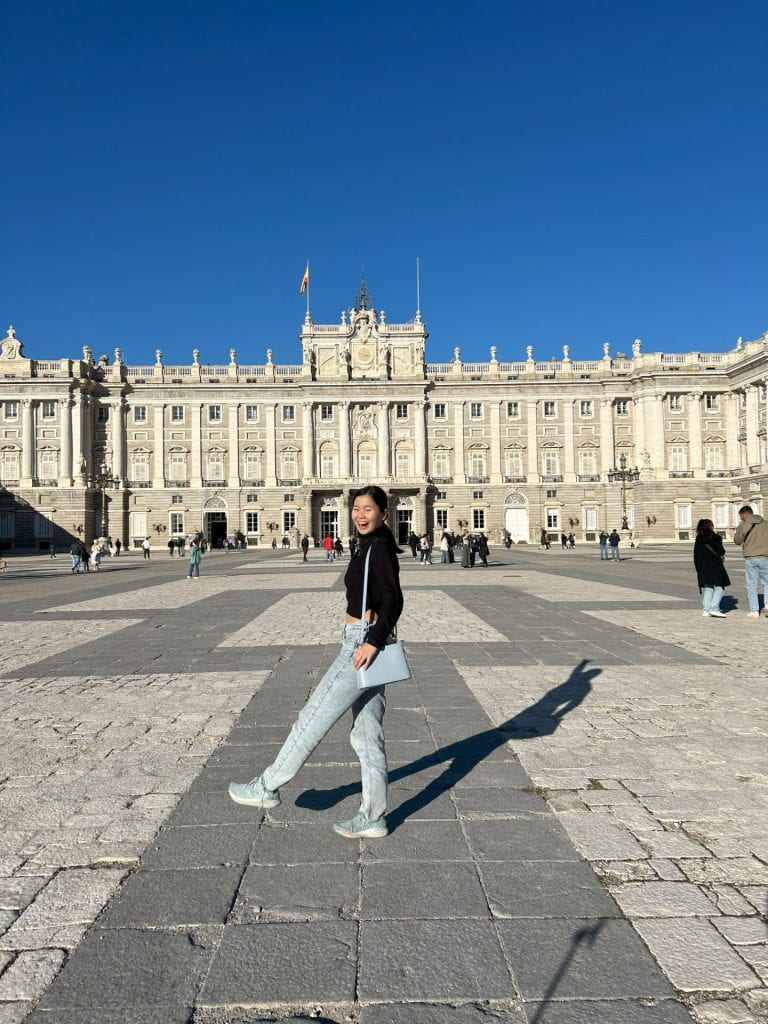Adiós, Salamanca

After concluding my semester in Salamanca, Spain, I’ve grown tremendously, not only as a student but as an individual. Throughout my time abroad, I faced tough challenges and had the best moments of my life. This experience of overcoming obstacles in a foreign country and sharing priceless moments with the people I met in Salamanca made my time abroad so special.
While I was quite occupied during the entire semester exploring, learning, meeting new people, and traveling, working on my research project about immigration in Spain allowed me to explore Salamanca with a unique perspective. Although living in a foreign country for a semester is already culturally immersive, taking the time to navigate the cultural nuances surrounding this historical and political topic of immigration has allowed me to understand the local culture at a deeper level.
One main takeaway from my project is that, as I expected, immigration is a very complex subject in Spain that requires context from multiple aspects of the society to comprehend fully. The first component is the history of immigration in the Iberian peninsula. I learned how the nation of Spain was established by immigrants from various locations throughout the centuries like the Iberos, Celts, Romans, Visigoths, Muslims, and more. Immigration allowed the people to exchange their valuable cultures and knowledge, laying the foundation for the nation of Spain we know today. Despite the wave of emigration during the Spanish Civil War and the Franco dictatorship (1930s-1970s), the restoration of a tolerant government drew many immigrants from other European nations, Latin America, Northern Africa, and Asia. This recent influx of immigrants to Spain has created lots of cultural exchange between immigrants and integration of their unique cultures into Spanish society.
Despite the long history of immigration in Spain, it is not always viewed positively. The tension around immigration is mainly due to the economic instability in Spain. Unfortunately, Spain has been struggling with high unemployment rates, especially among young adults, raising tensions. This hopeless sentiment around employment can often lead to people believing job opportunities are jeopardized by the large influx of migrants to Spain. These current harsh sentiments towards migrants have led to the rise of new political groups that push anti-immigration ideologies.
Learning about the history and current events around immigration in Spain has allowed me to notice certain parts of Salamanca that I overlooked before, especially art. I found many urban art pieces that shared messages of supporting migrants in Spain. These murals often depicted how as humans, we are all united and we should always be accepting of others, even if we may be different. In Madrid, I visited the Embajadores neighborhood to admire the urban art in this city and noticed similar themes of supporting migrants and immigrants to Spain. Focusing on this project has allowed me to view simple things like murals from a different perspective and dive deeper into the cultural nuances and current status around immigration.
As my time in Spain comes to an end, I finally understand why studying abroad is such a valuable experience. Throughout the entire semester, I have challenged myself to do things I never thought I’d be able to do before. For example, I never imagined I’d be able to engage in an hour-long conversation with a stranger on a train, all in Spanish, talking about the history and politics around Asian immigration in Salamanca. I never imagined I’d be wandering around the streets of Salamanca and Madrid, getting lost in the endless murals and artistic messages. I originally went into the semester thinking that my Spanish skills would improve. However, after my time abroad had ended, I realized I gained so much more than just language skills. Interacting with the local Salmantines at my favorite cafes, friends I made in the residence hall, and on-site staff allowed me to get a better understanding of the Spanish cultural values and nuisances I never knew before. Fully learning about the details and cultural importance of sobremesa, tapas, siesta, and gestures would not have been possible if I had not actually engaged in these activities with the Salmantines, who were so eager to welcome me into their culture. While I did realize that studying abroad would be an immersive experience, I didn’t imagine how much I could immerse myself in within only 3 months.
While an entire semester is a long time, it also went by so quickly. The initial culture shock, jetlag, and language barrier worried me at first, but these worries were soon filled with exciting adventures and priceless experiences. I feel like now that I finally got used to going for tapas and late night churros con chocolate, my time in Salamanca is up. I am so thankful that I got to call this city home for 3 months; It has been one of the best moments of my life.